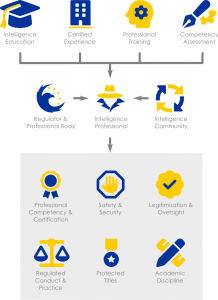Standardisation
Developing common European standards for covert intelligence disciplines.
Professionalisation
Independently applying professional standards to all registrants.
Centralisation
Uniformity of standards, assessment, evaluation, certification and registration across common governing bodies.
The Institute believes in protecting and promoting the interests of the covert professions through standardisation, professionalisation and centralisation. Fully accredited individuals and organisations make a pledge to maintain the ongoing professional standards expected by the public. The rank and status of professional and scholastic association bestowed with registration is an honour made in recognition of professional ability, integrity and competence amongst those who lead their profession in the service of peace and security. The Institute currently admits expert practitioners to the general register in the general field of Intelligence and to the specialist register in the fields of human intelligence (HUMINT), signals intelligence (SIGINT) and cyber.
Professional Membership
Whether choosing to pursue professional membership as an individual or as an organisation, the Institute facilitates entry routes and schedules membership in accordance with international standards for professional recognition.
Corporate Membership
The Institute is open to all types of organisations from private sector corporations to non-profit charities. The Institute accredits government agencies, academic institutions and even other governing bodies and membership organisations similar to the Institute. For whatever reason an organisation may have developed an intelligence or intelligence support capability, the Institute is available to assist and develop its members.
 To register for membership as an organisation all applicant organisations must undergo a capability assessment from an accredited assessor. This assessment may involve an escorted visit to the organisation’s headquarters to demonstrate minimum standards are met and supervised interviews with randomly selected members of staff to demonstrate competency. When legal, policy or even geographic concerns prevent such a visit, mutually agreed third-parties have been trained as accredited assessors by the Institute to make the visit on the Institute’s behalf and relay the conclusion.
To register for membership as an organisation all applicant organisations must undergo a capability assessment from an accredited assessor. This assessment may involve an escorted visit to the organisation’s headquarters to demonstrate minimum standards are met and supervised interviews with randomly selected members of staff to demonstrate competency. When legal, policy or even geographic concerns prevent such a visit, mutually agreed third-parties have been trained as accredited assessors by the Institute to make the visit on the Institute’s behalf and relay the conclusion.
There are three types of organisational membership, each of which confers different benefits accordingly:
- Membership by Proxy: Membership organisations, governance authorities and accrediting agencies apply for membership as Professional Affiliates. Meanwhile, intelligence agencies, departments or companies apply as Independently Assured Organisations (IAOs). Persons accredited by a Professional Affiliate or working for an IAO are considered de facto members by virtue of that status. They have the automatic right to be entered onto the Institute’s professional register and do not have to meet any further obligations regarding membership.
- Qualification by Proxy: Educational bodies and training institutions apply for membership as Licensed Institutions. Licensed Institutions can award Institute qualifications and may enter graduates from their own courses onto the register as if those graduates had qualified at the Institute directly. However, once upon the register, graduates of Licensed Institutions must continue to demonstrate the same ongoing professional development and practice requirements as other members.
Individual Membership
 Intelligence practitioners are welcomed into the Institute from all sectors. Business intelligence analysts in the private sector, military surveillance officers, law-enforcement intelligence support officers and technical specialists from intelligence agencies to name just a few. Whatever an applicants background, the Institute is the first step in acquiring the professional development necessary for launching a European career.
Intelligence practitioners are welcomed into the Institute from all sectors. Business intelligence analysts in the private sector, military surveillance officers, law-enforcement intelligence support officers and technical specialists from intelligence agencies to name just a few. Whatever an applicants background, the Institute is the first step in acquiring the professional development necessary for launching a European career.
To register as an independent member a candidate must first obtain a certificate from the Institute providing evidence that they have met the standards required for a membership designation:
- Education: An intelligence education equivalent to an accredited intelligence degree, approved qualifications, recognised accreditation for prior learning (APL) and/or other licensed qualifications covering all necessary competency domains.
- Training: At least 60 professional development hours in the year preceding application.
- Experience: At least three years of relevant European intelligence experience at no less than 450 hours per year.
- Examination: A passing grade in an approved entrance exam assessing the relevant competency framework.
After acquiring a certificate, registration is automatically processed unless the applicant requests otherwise. Registration lapses after twelve months, but is easily renewed. There are two designations of individual membership that can be applied for, each of which confers different benefits accordingly:
- General Designations: Technically skilled intelligence practitioners who collect, analyse and disseminate intelligence within the scope of activity permissible by law apply for the general designation. Employers are assured in appointment decisions and benefit from the quality assurance and regulation framework that guarantees accountability, compliance and integrity in intelligence operations. Meanwhile, practitioners enjoy the highly competitive career advantages implicit to such assurances.
- Specialist Designations: Exclusive specialists in covert operations, these operatives undertake additional training, education and assessment in their dedicated area of professional practice. Employers benefit from the reduction in corporate risk, enhanced trust and public confidence in this high-risk and sensitive field. In addition to the mastery and influence that specialist designation commands, these practitioners can also leverage the covert support apparatus inherent to such an expansive global network.
Ancillary Benefits
Professional registration is offered to both general intelligence practitioners and specialists within covert domains. Certification for registration is renewed every 12 months and is easily applied for online. In addition to the standard benefits of professional registration, the Institute confers official status and a full range of supporting benefits, including but not limited to:
- Official recognition under common legislative frameworks and by independent experts in line with industry competency requirements.
- Streamlined renewal of certification subject to audit and conditions.
- Access to confidential venues, events and a network of intelligence professionals.
- Quality assurance through independent assessment of professional standards and international recognition.
- Designations that uniquely differentiate professionals and their services.
- Service enhancement increasing the quality of services and value proposition to clients. Specifically with regards to ethics, oversight, capability and competency.
- Public support through rank, status, enforcement of standards and evidence of leadership, integrity and excellence that safeguards society and inspires confidence.
- The opportunity to work with the best talent in the field and recognised professional experts.
- Guarantees of independent accountability, capability and integrity results in employers consistently trusting professionals over practitioners. Resulting in salary enhancements through incerasing responsibility and ancillary positions as experts and in governance.
- The intelligence card promoting the mobility of intelligence professionals by validating registration and credentials.
- Global covert communications and courier networks rated to accommodate classified material.
- Access to industry publications citing professional standards, codes and the latest editions of current professional material.
- Awards, scholarships, reciprocal arrangements, affiliate links, mutual assurances and more…
Please note that not all of these benefits are conferred by default to all registrants. Some benefits are only available upon request and may be exclusive to either general or specialist registrants.

